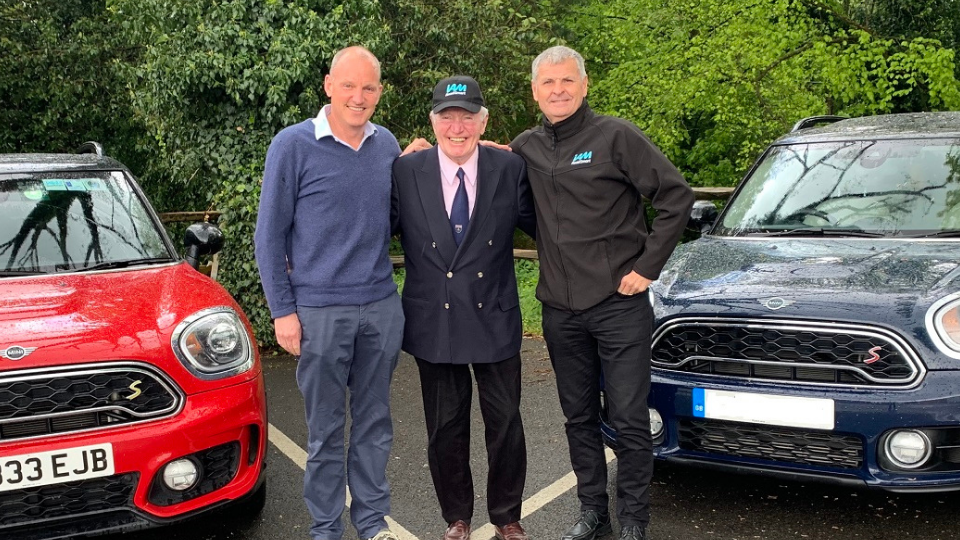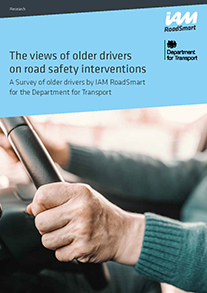Guidance for Older Drivers
Here at IAM RoadSmart (formerly the Institute of Advanced Motorists), we believe that older drivers bring a host of experience to UK roads, so it’s no wonder they are statistically one of the safest groups behind the wheel. Below are some of our top resources for older drivers, including some of the steps we recommend they take to ensure safe and confident driving for years to come.
Interested in our Mature Driver Review? Click below to learn more about our relaxed, impartial review of your driving:
Are older drivers safer?
With over five million UK drivers over 70, it's no secret that the UK driving population is aging. While getting older can mean slower reaction times, older drivers are statistically safer for a number of reasons:
- They have many years of driving experience, which can compensate for less rapid reflexes
- They are much more cautious drivers, and are less prone to taking risks
- Most self-regulate by not driving at times and in places they do not feel comfortable
- Few older drivers drink and drive or take illegal drugs, and most don’t speed
Try our free self assessment
It's important for older drivers to periodically review their driving skills, even if they consider themselves to be a capable motorist.
Our anonymous older driver's assessment will guide you through some of the checks older drivers can make. This is entirely a self-assessment, allowing you to find out more about how you can refresh your driving skills. These cover six key areas:
- Eyesight
- Physical mobility
- Tiredness
- Making decisions
- Medical conditions
- Driving history
Please note that any advice given is not a substitution for discussing concerns with a medical professional.
You can also download and print the self assessment here.
Video: Barbara's Story
“Driving is very important to me as it represents
freedom and independence”
Since retiring, Barbara still uses her car every day. Our Mature Driver Review is a refresher driving course for seniors, which gave Barbara a chance to top-up the skills she’s developed since passing her test 50 years ago. Watch the video to see Barbara’s story, or find out more about our Mature Driver Review.
Tips for safe driving
Getting older doesn’t necessarily spell the end for driving, and here at IAM RoadSmart we’re keen on encouraging and empowering older drivers for as long as it’s safe to do so. With that in mind, below are some of our top tips for older drivers:
1. Have regular eye tests
As we grow older, our eyesight can deteriorate or change - making it harder to see road signs and other road users. By having regular eye tests, older drivers can ensure that their eyesight stays within the legal limit to drive, and will make spotting hazards easier.
2. Check medications
Always seek advice from a doctor or medical professional if you are taking medicines which may impair your ability to drive, or if you notice a change in your ability to drive while on medication.
3. Inform the DVLA
There are certain medical conditions which you must inform the DVLA about by law. The conditions including glaucoma in both eyes, strokes, heart conditions and certain forms of diabetes.
4. Remove distractions
For older drivers who may have corrected hearing or vision, keeping the vehicle free from distraction is vitally important. Ensuring full concentration on the road and potential hazards will often result in a calmer and safer drive.
5. Drive in good conditions
While having the independence to drive anywhere at anytime is extremely important for older drivers, by planning your driving around good conditions (such as on clear, dry days) you can cut out some of the unnecessary risks of driving in wet or icy weather.
6. Keep your distance
Creating a ‘safety bubble’ of space around your vehicle will give you more time to prepare for unexpected hazards and can mitigate some loss in reaction times. It also gives you more time to plan and carry out simple procedures such as stopping at a junction.
7. Take a voluntary driving appraisal
Having an independent older driver assessment can help to top up the driving skills you first learned when passing your test. For many older drivers, a review of their driving results can give them a renewed sense of confidence to carry on driving safely for years to come.
Driving after 70? Renew with confidence
All UK driving licences expire when the holder reaches 70, but that doesn’t necessarily mean you have to stop driving at 70. You just need to renew your driving licence with the DVLA if you want to continue, and will need to renew it every 3 years after that.
For many drivers, knowing whether or not to renew their licence is an easy decision. However, one-to-one driving reviews can offer that extra level of confidence that you’re making the right choice. Some drivers even choose to have an older driver assessment every three years to coincide with their licence renewal dates.

"There is no age barrier to being better and safer behind the wheel”
Paddy Hopkirk MBE, 88 was an IAM RoadSmart Mature Driver Ambassador and Rally Legend who ensured his driving remained top notch through continuous training.
Find out more about the late Paddy’s driving achievements.
Our latest report

More and more Britons are living longer and healthier lives but, as this report finds, the car is still by far the most popular transport option for them and one they are not keen to give up. This report looks at the attitudes of older drivers regarding themselves, their peers, and ways to increase the safety of older drivers. This includes options such as our Mature Driver Review which is a driver refresher course for seniors to top up their skills with an independent and impartial assessor.
Additional resources
Driving after 70 - What happens next?
Once you reach the age of 70 your driving licence automatically expires. To renew it, you must fill in a self-assessment declaring you are fit to continue driving.
Concerned about someone's driving?
Tim Shallcross, Head of Technical Policy at IAM RoadSmart has pulled together top tips on safe driving for loved ones.
The end of the road?
Talking to a close relative about their driving can be difficult. Read our Head Of Technical Policy & Advice Tim Shallcross's blog on his experience.
Mary Berry's driving review
Read how former Great British Bake Off judge and advanced driver Mary Berry took IAM RoadSmart’s Mature Driver Review (then called Assessment) in 2016.


